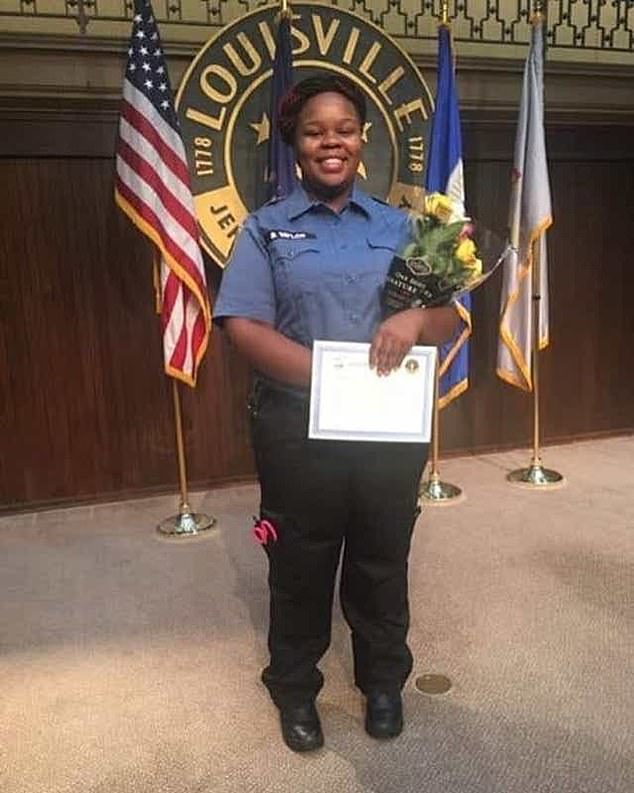
Who is Brett Hankison?
BRETT Hankison, one of four police officers accused of killing Breonna Taylor in 2020, was arrested on August 8, 2022.
He was fired in June 2020 after the Louisville, Kentucky, police chief said Hankison fired his gun indiscriminately into Taylor's apartment.
Who is Brett Hankison?
Brett Hankison was a police officer with the Louisville Metro Police Department since 2003 before he was fired for his alleged role in the death of Breonna Taylor.
He was one of five members of the “Police Merit Board,” which consists of three civilians and two police officers selected by the River City Fraternal Order of Police.
A lawsuit was filed against Hankison in 2019 by Kendrick Wilson, who claimed he was falsely arrested and accused of selling narcotics.
The lawsuit claims Hankison planted the drugs nearby outside a local bar before stopping Wilson and allegedly demanding he turn out his pockets, the lawsuit claims.
A passerby allegedly told Wilson that he saw Hankison plant the drugs and had recorded it on video, but Wilson was arrested and charged with a $500 bail fee.
The case is still ongoing and Hankison has denied the accusations against him.
Wilson could not be reached for comment in time for this article.
What new charges were filed against Brett Hankison?
Hankison and four other police officers have been charged with federal crimes related to Breonna Taylor's death.
Attorney General Merrick Garland confirmed the news at a press conference on August 8, saying Hankison, fellow ex-detective Joshua Jaynes, and current officers Kyle Meany and Kelly Goodlett are facing charges including civil rights offenses, unlawful conspiracies, unconstitutional use of force, and obstruction.
He said Hankison is being charged with two counts of deprivation of civil rights, and the US Department of Justice issued a statement saying: "Hankison willfully used unconstitutionally excessive force, while acting in his official capacity as an officer, when he fired his service weapon into Taylor’s apartment through a covered window and covered glass door."
The first charge accuses Hankison of depriving Taylor and her boyfriend of their constitutional rights when he fired shots through her bedroom window.
The second charge accused Hankison of depriving three neighbors of their constitutional rights when he fired shots through a glass door that was covered by blinds and a curtain.
Hankison's lawyer did not respond in time for this article.
"Both counts allege that Hankison used a dangerous weapon, and that his conduct involved an attempt to kill," the statement said.
Assistant Attorney General Kristen Clarke said during the press conference: "Since the founding of our nation, the Bill of Rights to the United States Constitution has guaranteed that all people have a right to be secure in their homes, free from false warrants, unreasonable searches, and the use of unjustifiable and excessive force by the police."
She continued: "These indictments reflect the Justice Department’s commitment to preserving the integrity of the criminal justice system and to protecting the constitutional rights of every American.”
What other charge was filed against Brett Hankison in the Breonna Taylor shooting?
On Wednesday, September 23, 2021, a Kentucky grand jury charged Hankison with three counts of wanton endangerment for shooting into a home next to Taylor’s with people inside.
Nearly two years after Taylor's death, the former officer was acquitted of the charges on March 3, 2022.
AP News clarified that Hankison is not on trial for the death of Taylor, but rather for "firing bullets that went into an adjacent apartment, endangering a pregnant neighbor, her young child, and her boyfriend."
When asked if he had done anything wrong Hankison replied, "absolutely not."
In regards to Taylor's death, he said: “She didn’t need to die that night.”
Hankison's lawyer, Stew Mathews responded to the acquittal, saying in a statement: “I think it’s a good day, finally, for law enforcement.”
At the time, a spokesman for the FBI said alongside the Justice Department, they were working “to determine what, if any, federal charges are warranted.”
Ben Crump, the lawyer for Taylor's mother said in a statement: “The lack of accountability showcased in every aspect of Breonna’s killing speaks to how much more work there is to be done before we can say our justice system is fair and our system of policing is protective of people of color.”
What happened to Breonna Taylor?
Taylor was a 26-year-old medical technician living with her boyfriend in Louisville, Kentucky when, on the night of March 13, Louisville police officers entered Taylor and Kenneth Walker’s home using a battering ram without a search warrant and opened fire over an alleged drug bust.
Jefferson County Circuit Judge Mary M Shaw had included Taylor and Walker’s home in a “no-knock” search warrant which was based upon the police's belief that a man was using the home to receive illicit packages.
The suspect had been seen allegedly entering that home with a USPS package before driving off to another house.
Louisville police claimed that they announced themselves as they were entering the home with the warrant, however, neighbors said that they never heard announcements, and Walker thought it was someone breaking in.
Walker, a licensed firearm carrier, shot first, striking a police officer in the leg, and in response, the officers opened fire with more than 20 rounds.
Ultimately, the people they were looking for did not reside in Taylor’s apartment and no drugs were found.
Taylor was fatally shot eight times.
The police report stated Taylor had no injuries and that no forced entry occurred.
Commonwealth's Attorney Tom Wine moved to dismiss all charges against Walker and was granted immunity because he was within his rights to defend himself and Taylor under Kentucky’s stand-your-ground law.
Chief of Police Robert Schroeder said that Hankison had no "supporting facts" to prove that Taylor was a threat when he fired the rounds.



